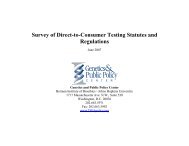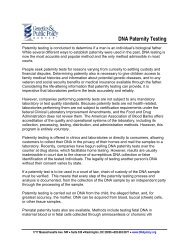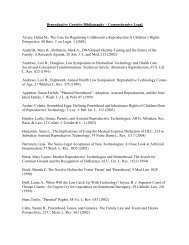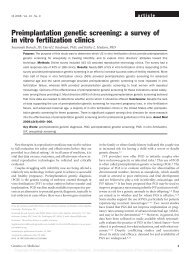Preimplantation Genetic Diagnosis - Genetics & Public Policy Center
Preimplantation Genetic Diagnosis - Genetics & Public Policy Center
Preimplantation Genetic Diagnosis - Genetics & Public Policy Center
You also want an ePaper? Increase the reach of your titles
YUMPU automatically turns print PDFs into web optimized ePapers that Google loves.
CDC analyzes the data and makes its findings available to the<br />
public, including via the Internet. The data are collected from<br />
clinics by the Society for Assisted Reproductive Technologies<br />
(SART), a professional society whose members comprise<br />
clinics engaged in reproductive medicine.<br />
In 2001, the most recent year for which data are available, 384<br />
clinics reported data to SART. The law requires CDC to list<br />
on its website the names of clinics that do not report at all or<br />
that fail to verify the accuracy of the data. Thirty-seven clinics<br />
are listed as non-reporters. Other than being listed by CDC,<br />
there are no penalties for failure to report.<br />
Food and Drug Administration<br />
FDA regulates drugs and devices, including those used as part<br />
of IVF treatments (such as drugs to induce ovulation and<br />
laboratory instruments used in IVF). Depending on the type<br />
of product, FDA may require submission of data from clinical<br />
studies (premarket review) and agency approval before the<br />
product may be sold.<br />
Some of the products used by clinical laboratories to perform<br />
genetic tests are regulated as medical devices by FDA.<br />
However, most genetics laboratories develop their own tests,<br />
and FDA’s jurisdiction over these so-called “home brew” tests<br />
has been a subject of debate. FDA does not currently regulate<br />
home brew tests, although it does regulate certain components<br />
that laboratories use to make them. Given the existing<br />
confusion about FDA’s jurisdiction over genetic testing in<br />
general, there is uncertainty regarding its authority to regulate<br />
PGD tests.<br />
FDA also regulates human tissues intended for<br />
transplantation. The agency’s statutory authority is limited to<br />
preventing disease transmission. FDA regulations require<br />
facility registration, screening to detect infectious diseases,<br />
record keeping and the proper handling and storage of tissues.<br />
FDA can inspect tissue banks and order the recall or<br />
destruction of tissue found to be in violation of regulations.<br />
Recently, FDA has decided to extend this form of limited<br />
regulatory oversight to reproductive tissues under certain<br />
circumstances.<br />
In addition, FDA regulates certain human tissue-based<br />
therapies as “biological products,” such as tissues that are<br />
manipulated extensively or are used in a manner different<br />
from their original function in the body. However, FDA has<br />
not determined that reproductive tissues are “biological<br />
products” when used for IVF or PGD procedures and has not<br />
required premarket review for these tissues. Whether FDA has<br />
the legal authority under current statutes to take such a<br />
position, and whether it would choose to do so even if it did,<br />
is an open question.<br />
Although FDA regulates claims a manufacturer may make<br />
about an approved product, it does not have authority to<br />
regulate the actual uses of approved products by physicians.<br />
Such decisions are considered part of medical practice. Thus,<br />
even if FDA required premarket approval for the reproductive<br />
tissue or the genetic tests used as part of PGD and limited the<br />
claims that could be made about them, the agency could not<br />
restrict the actual use of these products by PGD providers.<br />
<strong>Center</strong> for Medicaid and Medicare Services<br />
CMS implements the Clinical Laboratory Improvement<br />
Amendments of 1988 (CLIA). CLIA was enacted in order to<br />
improve the quality of clinical laboratory services. Although it<br />
is administered by CMS, it applies to clinical laboratories<br />
regardless of whether or not they service Medicaid and<br />
Medicare beneficiaries. CLIA defines a “clinical laboratory” as<br />
a laboratory that examines materials “derived from the human<br />
body” in order to provide “information for the diagnosis,<br />
prevention, or treatment of any disease or impairment of, or<br />
the assessment of the health of, human beings.”<br />
CLIA includes requirements addressing laboratory personnel<br />
qualifications, documentation and validation of tests and<br />
procedures, quality control standards and proficiency testing<br />
to monitor laboratory performance. CMS has not taken a<br />
position regarding whether laboratories engaged in IVF<br />
(sometimes called embryology or embryo laboratories) are<br />
“clinical laboratories” within the meaning of the statute. CMS<br />
has similarly not taken a position regarding whether<br />
laboratories that engage in the genetic analysis component of<br />
PGD are subject to regulation as clinical laboratories.<br />
The outstanding question is whether the genetic tests<br />
performed in PGD laboratories provide information that will<br />
be used to diagnose, treat or prevent disease or to assess<br />
human health. Some within the agency worry that including<br />
PGD within the definition would require CMS to take the<br />
position that an embryo meets the legal definition of a human<br />
being, although it is unclear whether this concern is wellfounded<br />
since neither the agency nor any court has had<br />
occasion to formally address it. In addition, IVF providers<br />
argue that their activities constitute the practice of medicine<br />
and are not within the scope of CLIA.<br />
If CLIA were applied and enforced with respect to<br />
laboratories performing embryo biopsy, then the laboratories<br />
would need to comply with the rules applicable to all other<br />
clinical laboratories, including those relating to personnel,<br />
record keeping, documentation, specimen handling and other<br />
quality control and assurance measures. The federal<br />
government also would have the authority to inspect PGD<br />
laboratories and review their records, and to impose sanctions<br />
on those not complying with the regulations.<br />
If CLIA were applied and enforced with respect to genetic<br />
analysis of preimplantation embryos, laboratories engaged in<br />
this activity would be required to do proficiency testing under<br />
CLIA’s general proficiency testing requirements for high<br />
8










